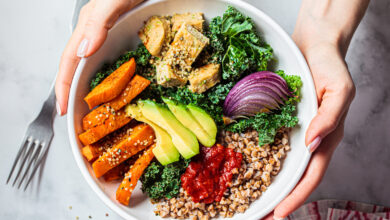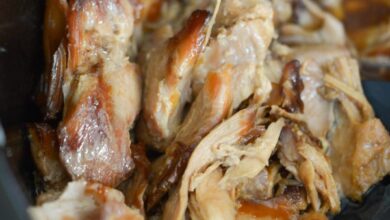- Fatty Fish – Salmon, mackerel, and trout are excellent sources of omega-3 fatty acids, which are renowned for their potent anti-inflammatory properties. These healthy fats are known to reduce joint stiffness and pain. Aim for at least two servings per week.
- Berries – Blueberries, strawberries, and raspberries are rich in antioxidants, particularly ant hocyanins, which combat inflammation and protect joint tissues from damage. These vibrant fruits are not only delicious but also a powerhouse of joint-friendly nutrients.
- Nuts and Seeds – Walnuts, flaxseeds, and chia seeds are nutritional powerhouses packed with omega-3s, fiber, and antioxidants. These components collectively work to reduce inflammation and promote overall joint health.
- Leafy Greens – Spinach, kale, and other dark leafy greens are not only packed with essential vitamins and minerals but also rich in vitamin K. This nutrient plays a pivotal role in maintaining healthy bones and reducing inflammation in the joints.
- Turmeric – This golden spice contains curcumin, a potent anti-inflammatory compound. Incorporating turmeric into your diet through curries, teas, or supplements can provide substantial relief for joint pain and inflammation.
- Ginger – Known for its anti-inflammatory properties, ginger can be a game-changer for joint health. It can be grated into dishes or steeped into a soothing tea, offering a natural remedy for joint discomfort.
- Broccoli – This cruciferous vegetable is high in sulforaphane, a powerful compound that may help prevent or slow the progression of osteoarthritis. With its versatility, broccoli can be easily incorporated into various dishes for a joint-friendly boost.
- Cherries – Cherries are rich in anthocyanins, which have been shown to reduce inflammation and pain associated with arthritis. Whether fresh or frozen, adding cherries to your diet can be a delightful way to support joint health.
- Oranges and Citrus Fruits – Oranges, grapefruits, and other citrus fruits are high in vitamin C, which is essential for collagen production and maintaining healthy joint tissues. Additionally, vitamin C is known for its anti-inflammatory properties.
- Olive Oil – Extra virgin olive oil is rich in monounsaturated fats and antioxidants, which help reduce inflammation in the body. It’s a great alternative to other cooking oils.
- Green Tea – Packed with polyphenols, green tea has been shown to have anti-inflammatory effects. Regular consumption may help alleviate joint pain and protect against cartilage damage.
- Pineapple – This tropical fruit contains bromelain, an enzyme known for its anti-inflammatory properties. Bromelain can help reduce joint pain and swelling, making pineapple a tasty addition to a joint-friendly diet.
12 Worst Foods for Joint Pain
- Processed Foods – This category includes items like fast food, sugary snacks, and pre-packaged meals. They tend to be high in refined sugars, unhealthy fats, and artificial additives, all of which can exacerbate inflammation and contribute to joint pain.
- Sugary Beverages – Sodas, energy drinks, and sugary fruit juices are packed with added sugars and offer little to no nutritional value. Excessive consumption of sugary beverages can lead to increased inflammation, making them best enjoyed sparingly.
- Red and Processed Meats – These meats are high in chemicals like advanced glycation end products (AGEs) that can promote inflammation in the body. While they are a source of protein, it’s advisable to opt for leaner cuts and explore plant-based protein alternatives.
- Dairy – Some individuals may find that dairy products worsen their joint pain due to their potential to trigger inflammation. Experimenting with dairy alternatives like almond or soy milk can be a helpful step for those experiencing discomfort.
- Alcohol – Excessive alcohol consumption can lead to inflammation and may exacerbate joint pain. It’s advisable to enjoy alcoholic beverages in moderation or consider exploring healthier alternatives like herbal teas or infused water.
- Fried Foods – Foods that are deep-fried or heavily processed using unhealthy fats can contribute to inflammation and joint discomfort. Opting for baked, grilled, or steamed alternatives can significantly reduce the negative impact on joint health.
- Artificial Trans Fats – Found in many processed snacks, baked goods, and margarines, trans fats are known to promote inflammation and should be avoided for optimal joint health. Always check food labels for trans fats and aim for products with zero trans fats.
- Nightshade Vegetables – Some individuals with joint pain may find that nightshade vegetables like tomatoes, potatoes, and eggplants can exacerbate their symptoms. These vegetables contain solanine, which may contribute to inflammation in certain cases. It’s important to observe your body’s response and adjust your diet accordingly.
- Sugar Alternatives – While artificial sweeteners may seem like a healthier option, some studies suggest they can trigger inflammation. It’s best to consume them in moderation or opt for natural sweeteners like honey or maple syrup.
- Excessive Salt – High sodium intake can lead to water retention and may exacerbate joint swelling. It’s important to monitor your salt intake, especially if you have joint issues.
- Corn Oil – Corn oil is high in omega-6 fatty acids, which, when consumed in excess, can lead to an imbalance of omega-3 to omega-6 ratios. This imbalance can contribute to inflammation. Choosing healthier cooking oils like olive oil or avocado oil is recommended.
- White Bread and Pastries – Foods made from refined grains, such as white bread and pastries, can lead to spikes in blood sugar levels and promote inflammation. Opt for whole grains like whole wheat, quinoa, and brown rice for joint-friendly alternatives.
2,142 5 minutes read




